- Home
- James Grady
Nature of the Game Page 6
Nature of the Game Read online
Page 6
“I’ll call it an educational expense,” said Nick.
“Submit it to Murphy.” Jud smiled when he said the columnist’s name.
“This will come out of my other professional pocket. To charge it to Peter, you’d have to help me on some story.”
“Ah,” said Jud.
Outside, streetlights and neon made M Street glow. Amplified rock music thumped from a guaranteed-totally-nude go-go bar. Nick raised his hand toward a cab but Jud stopped him.
“We agreed I’d give you a ride home.”
“Thought I’d save you the trouble.”
“No trouble,” said Jud.
They walked to a van parked by Murphy’s office. The vehicle smelled of oil and rust. Machine parts clanked in bins as they motored toward Capitol Hill. They passed the White House, the Treasury building. The glistening dome of the Capitol came into sight, a view that always quickened Nick’s heart. The same scene was on his high school government textbook.
As the van climbed up the Hill, Nick realized Jud hadn’t asked where he lived.
“That your place?” said Jud, pointing to the apartment building six blocks off congressional turf. He pulled over.
“Yes,” said Nick; thought, But you already know that.
Jud shut off the van. “Let’s see how my pen works.”
At the building’s entrance, he told Nick, “You get this door. Don’t do your shit on the street if you don’t have to.”
Even Nick knew the frontdoor lock was simple. He led Jud down the hall. Deliberately didn’t check his locked mailbox in the foyer’s yellow stucco wall. Climbed the stairs to his second-story rear apartment and double-locked blue door.
“Hold this, will you?” Jud handed him the red nylon gym bag. Zipped closed. It weighed about ten pounds. A passport, a résumé. The pen was metamorphosing in Jud’s hand.
“Time me,” said Jud. He slid a pick into the lock.
By the sweep of Nick’s second hand, thirty-three seconds later came a faint click. Jud grinned.
“Don’t stop the clock,” he said. “Not till it’s over.”
The knob lock took Jud fifteen seconds. He opened the door.
“Welcome home,” said Jud.
Nick’s bowels turned cold.
“Nice,” said Jud, standing in the tiled living room, his eyes scanning the museum prints, the stereo and albums, crammed bookcases, and thrift-store furniture. “Your office back there?” Jud walked toward the kitchen, looked in the room with its desk and typewriter, stacks of books and paper.
“Yes,” said Nick. He could make it out the door before Jud could reach him. If he had to run.
Jud ignored the dining room and kitchen, came back to the living room. He pointed to a doorway opposite the entrance.
“Your bedroom?” he asked.
Nick didn’t reply.
A newly arrived British edition of Flight of the Wolf lay on the couch. The jacket was identical to the American edition. Jud grinned at the author’s picture, held it up for Nick to see.
“Looks just like you,” he said of the photo Janey had snapped one Michigan December morn. “No wonder I knew who you were.
“It says,” continued Jud, “you studied karate and judo.”
“True,” said Nick, who’d regretted telling that to the publisher as soon as he saw the book jacket.
“Tae kwon do?” said Jud, putting down the book.
Nick took a step back. Kept his eyes on Jud, put the nylon gym bag on the floor. “Yes. Some shudo kan.”
“How far did you get?”
“Not far.” Two years of judo. Two years of karate. It’d been a year since he’d been in a dojo. He tried to relax, wait.
“Tae kwon do isn’t bad,” said Jud. Six feet separated them. “Dogmatic and linear, but okay. I’m a China kinda guy, Southern Shaolin, mix in other disciplines. Let me show you.”
He slipped off his shoes and socks.
You’re still in charge, Nick told himself. He slipped off his shoes and socks, pushed away some of the furniture.
“Get in your fighting stance.”
All Nick needed to do was raise his hands.
Outweighs me by seventy, eighty pounds, thought Nick. Can’t all be fat, can’t all be slow.
Can’t all be great, either. If, thought Nick, you win or you die.
“I’ll do straight Shaolin, let you see that,” said Jud. “We’ll take it easy. Don’t worry.”
Like in the dojo, thought Nick. Nothing to fear. Three-quarters speed. No contact. Pulled punches. To learn. For fun.
Jud stood still, arms at his sides.
“Go ahead,” he told Nick. “Take your best shots.”
Nick snap-kicked toward Jud’s stomach, half feint, and Jud wasn’t there. Nick punched for the chest to draw out Jud’s block; did so and snapped back his fist, chopped with his left to block a back fist that turned into a parry knocking his chop away. Nick countered with another right punch.
The bear grabbed it, pulled. Jud’s right foot thumped into Nick’s chest, then Jud sank into a squat and hooked his right leg behind Nick’s, swept Nick’s feet into the air.
Nick crashed onto his living room tiles.
Clarity returned. Nick blinked. Saw Jud’s hand in front of his face. Froze.
Jud plucked Nick off the floor as if he were a pillow.
“Not bad,” said Jud, “but do you see what I mean about linear? This time, I’ll mix it up a little.”
Nick went full speed. Jud seemed to move slower. He blocked Nick’s punch, stuck to his arm, said, “Block, and then aikido,” and he led Nick forward. Lightly touched his sternum. A giant hand uprooted Nick, pushed him through the air. He flew six feet straight back, hit the wall with his heels half a foot above the baseboards, then crashed to his hands and knees.
Again and again. Attacks and counterattacks. Nick fought as hard as he could, his body tiring and sore. Carefully lecturing, never straining, Jud would “break” Nick’s elbow, tap his throat or eyes or the ribs above his heart, pull Nick’s punch into an immobilizing arm bar. Jud turned his fingers into a parrot’s beak; drove that hook into a nerve near Nick’s collarbone that novaed the world and dropped Nick like a stone. Jud dissolved before Nick’s punches, then stole Nick’s chi, used it to throw him back like God sweeping away table scraps.
Nick refused to show pain. Never said stop.
“What time is it?” Jud asked suddenly. He held up an empty wrist. “I hate clocks.”
On the floor, Nick glanced at his watch. “Ten thirty-two.”
“Hell,” said Jud, “I got to go.”
He helped Nick up.
“This was fun,” said Jud. “Maybe we’ll do it again.”
He walked to the door.
“Oops!” He turned back, picked up his gym bag of secret gear. “Wouldn’t it have been funny if I forgot this?”
“Yeah,” said Nick, his heart hammering his ribs.
He drew a normal breath; another. With that air came the realization that a power in which he’d believed but never known had now been met; hell, the power had held him like a doll in its hand.
“Take care, Bro’,” said Jud. As he stood in the open exit, he looked back, smiled. “Be sure to lock your door.”
HALO
In the spring of 1990, the road beneath the wheels of Jud’s stolen car angled northeast from L.A. The sky turned gray with the coming dawn. He figured he had a few hours yet before this Chevy was reported stolen and logged into the highway patrol’s computer. Not much time, and he didn’t know if he could stay awake to use it.
A green exit sign said REST STOP. He pulled in, rolled past semi trucks, their drivers napping in cab bunks. A Doberman pinscher poked his head above one semi’s steering wheel.
Never liked big trucks anyway, thought Jud.
A man in a cowboy hat shuffled into the bathroom from a cattle truck loaded with battered furniture. No one else was in the truck. Jud parked, grabbed his bags, and hurried toward that
vehicle. He’d worn cotton gloves ever since stealing the car in L.A. If he could make this E&E improve, he’d leave no trail. A blackboard blocked the truck’s rear window. Jud threw his bags in the cargo box and crawled over the side. He settled in the shadows, between a battered rocker and a musty couch.
Don’t check, he prayed. Don’t check, he willed.
The driver didn’t. Came back and pulled the truck into the highway, drove it down the road. Two miles later, Jud stretched out on the couch. He drifted to sleep. Cold wind rushed around him, carried him to dreams of warmer days….
Saigon, 1969. The damp city smelled like barbecuing fish and diesel fumes. And just a whiff of nerves. The enemy’s Tet Offensive was more than a year-gone history. That countrywide chaos was a political victory but a military defeat for the guerrilla Viet Cong and their North Vietnamese Regular Army buddies: this was one tough, strange little war.
But life went on in Saigon, as if Tet had only been a passing show, a bad moment before Act Three when the Good Guys would win. True, there’d been a secret revolt in the American military’s high command in ’67 because the Joint Chiefs of Staff felt there was no coherent policy in this conflict they were commanding, but cooler heads had prevailed, the Joint Chiefs called off their mass resignation, and their revolt stayed secret, even after Tet. In Saigon on this September day in 1969, the program was to win the war, whatever winning meant.
But as Jud sat on a couch in the living room of House 12, a mustard-colored dwelling surrounded by a high wall just off Rue Louis Pasteur, sharing warm Vietnamese beer with two other Americans, his mind was on immediate personal survival, not foreign-policy abstractions.
Officially, Jud wasn’t in Vietnam. Officially, he was a sergeant in the 5th Special Forces, the U.S. Army’s elite Green Beret counterinsurgency unit beloved by murdered President Kennedy and the CIA and hated by the Regular Army. Officially, Jud was stationed with a Green Beret logistics support team in the Philippines.
In reality, Jud was assigned to MACV-SOG—Military Area Command, Vietnam—Studies & Observation Group, a low-profile group drawn from all branches of the military and the CIA that was officially studying the lessons of the Vietnam war. In reality, SOG was an ultrasecret spy and clandestine warfare unit charged with everything from in-country reconnaissance to infiltrating mainland China, from prisoner-of-war rescues to assassinations.
Neither Jud nor the two men he was drinking beer with were in uniform. If they had been, they would all have worn green berets and paratrooper wings, yet another level of sophistication separating them from most of the half a million other American soldiers then in Vietnam.
If Jud and the men in the living room of that SOG safehouse had officially existed.
Jud had only met these men that afternoon. They exchanged first names and the sly smiles of a fraternity secret even to its own members, kept everything else on the anonymous bullshit level. The closest Jud came to mentioning the incident that he’d been ordered down to House 12 from Da Nang to explain was when he told his two new asshole buddies that this was one fucking weird war. He’d started to tell a lie about his romantic conquests during his brief junior-college career when a trim man in a suit strolled into the living room.
“Captain,” said one of the men, and they all rose.
“As you were,” said the officer. He had blond hair and blue eyes, a small scar on his cheek. He was maybe thirty to Jud’s twenty-one. He carried a manila envelope.
“We’re ready for you in there, Sergeant,” he told Jud, nodding toward the back-room office.
As they reached the door, the captain said, “Don’t worry about this bullshit. Piece of cake, pro forma.”
He smiled. “And congratulations. Your R and R request has been approved.”
The captain handed Jud the sealed manila envelope.
Jud hadn’t made a Rest and Recreation request.
“Call me Art,” the captain told Jud.
“Come in, gentlemen,” said a voice in the back room.
The captain named Art had been right: Jud’s debriefing that afternoon had been a piece of cake. Bullshit. Afterward, Jud opened the manila envelope, found the commercial airline tickets, and orders he burned after reading. He had time to pick up his bag, catch the sunset flight.
To Vientiane, Laos.
When Jud arrived, he went to the White Rose bar, where a naked girl danced on tabletops and garnered tips from the sports-shirt-clad Americans by holding lit cigarettes in her vagina. She was up to four cigarettes at once when the captain from House 12 strolled in, wearing a different tropical suit. He glanced toward Jud’s table, went to the bar. Had a quick drink. Left. Jud strolled outside in his wake.
“Here,” came Art’s voice from a bicycle rickshaw.
Art took Jud to Rendez-vous des Amis, Madame Lulu’s brothel where that French septuagenarian schooled shy Laotian girls in the art of fellatio. They walked past the downstairs parlor where the pancake made-up proprietress poured Scotch for her customers while they picked their pleasure, climbed two flights of stairs to the roof.
They walked out to the edge. Vientiane smelled of foliage. The lights of the city were scattered and few compared to Saigon. A Ford Bronco was parked in the street below.
A man in a white linen sports jacket stepped out of the roof’s shadows and shook their hands with a clammy grip.
He was an American. Art was blond; the man in the linen suit was paler, almost an albino in skin color and translucent white hair, a ghost with blue eyes.
“Look over there,” said Ghostman. “Those lights are the Chinese embassy. Russians are here. Uncle Ho’s diplomats. There’s even a Pathet Lao legation a few hundred meters from our embassy. We’re all very polite.
“This is our war, and we’re winning it our way,” boasted Ghostman. “We’re doing a better job with five hundred CIA officers than half a million GIs are doing in Vietnam. They shouldn’t have taken that war away from us. Our Laos is cost-effective foreign policy.”
Something stirred in the shadows on the roof.
The man in the white linen jacket whirled, jerking a Browning 9mm from a shoulder holster.
“Just a gecko,” said Art, shaking his head to Jud.
“I know what it is, Monterastelli!” snapped the CIA man.
And Jud smiled: now he had the full name—Capt. Art Monterastelli.
We’re more equal now, thought Jud.
“Don’t want to kill him,” said Ghostman as the lizard scurried away. “The French say that’s the start of sickness, the sign that it’s time to leave Asia. When you start killing geckos.”
“It isn’t geckos you want dead,” said Jud.
“No shit,” said Ghostman. He holstered the pistol, pulled a marijuana cigarette from his shirt. “Want some?”
“I don’t smoke,” said Jud.
Ghostman laughed. “Of course you don’t! You aren’t even here! None of us are! There’s one senior officer in SOG who knows this nitty-gritty, plus we three stooges on a whorehouse roof.”
“Who’s the senior officer?” asked Jud.
“You don’t need to know,” said the CIA liaison. He clicked a Zippo lighter: Capt. Art Monterastelli and Jud stepped away from that flicker of flame.
“Now who’s paranoid?” said Ghostman.
“Sergeant Stuart,” he said, “the people who count know what a fine job you’ve done. Damn good. You’re the kind of man America can depend on. We think you’re our kind of man. We’ve had our eye on you. We think you’re ready for the big time.”
“Is that what this is?” said Jud, resisting the urge to challenge Ghostman’s arrogance with a dozen examples of past exploits.
Art kept his gaze flat. He had a boyish face.
“God, this is a backwater!” Ghostman said. “These people believe there’s spirits everywhere—in rocks, our airplanes, people. Call it phi.”
A man moaned in a room downstairs.
“We want you to do something for us,” said Ghostman.
“It’s risky, catch-as-catch-can. It’s vital. It’s gotta stay buried deep. We think you can do it. If you don’t think you can handle it, if you say no”—he shrugged—“we’ll understand.”
Then they told him what they wanted.
Two months later, Jud was in the belly of a B-52 bomber, 43,000 feet above enemy North Vietnam: 2322 hours, 19 November, 1969. The plane had a skeleton flight crew of four American fly-boys, the right number for this moonless night’s mission.
The plane shuddered as its payload sailed down to earth.
Cold. Jud was so cold.
Cramped, sitting on the bomb-bay rack, he’d been embraced by the cold, numbed by it and by the drone of the jet’s engines. The metallic air he breathed through his oxygen mask chilled his lungs. When the bomb-bay doors cranked open, he’d looked through the steel catwalk under his boots, watched giant, finned barrels roll out into blackness.
One one-thousand. Two one-thousand.
The bomb-bay doors stayed open. In the dim red light, Jud imagined he could see through the goggles and oxygen masks to the eyes of the five men sitting beside him. The four Nungs would show all white. Their throats were dry, like his; their pants wet, like his wanted to be. Next to them was Curtain, the one-one to Jud’s one-zero. Curtain was second-in-command. He and Jud filled out the crew’s official full-strength quota, in case Uncle Ho’s boys got lucky with one of their Soviet surface-to-air missles and they had to play it as a normal mission. And don’t think about the Nungs, don’t think about what would happen to them in the chaos between enemy hit and bailout or impact.
What are you thinking, Curtain? Jud wondered. What’s in your heart?
Twenty-three one-thousand. Twenty-four one-thousand.
Curtain could see no better in the light silence than Jud. He was just as cold. God knows what the Nungs feel, thought Jud. This must be colder than any grave they ever dreamt.
Thirty-one one-thousand. Thirty-two one-thousand.
The plane arced, turned south and west, pushing Jud back against his main parachute. G forces sucked Jud’s aching guts.
Forty-two one-thousand. Forty-three one-thousand.
Back toward the tail, in the swirling blackness below: silent orange mushroom flashes.

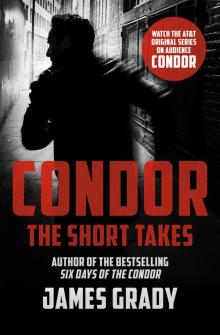 The Short Takes
The Short Takes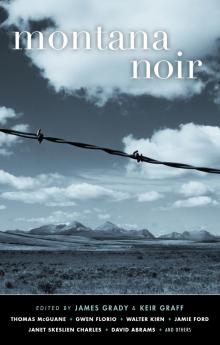 Montana Noir
Montana Noir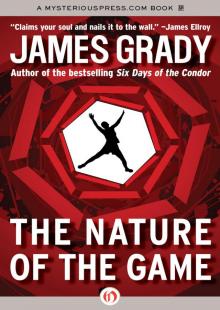 Nature of the Game
Nature of the Game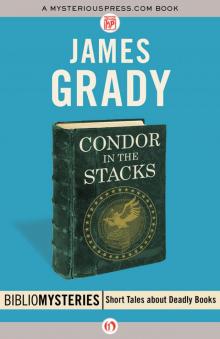 Condor in the Stacks
Condor in the Stacks This Given Sky
This Given Sky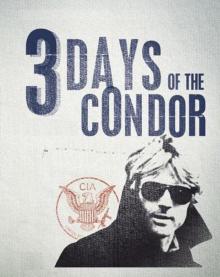 Three Days of the Condor
Three Days of the Condor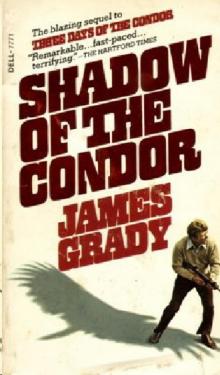 Shadow of the Condor
Shadow of the Condor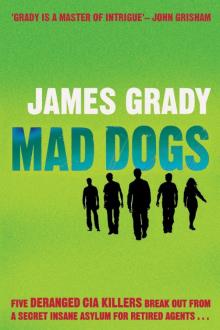 Mad Dogs
Mad Dogs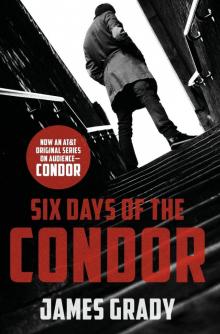 Six Days of the Condor
Six Days of the Condor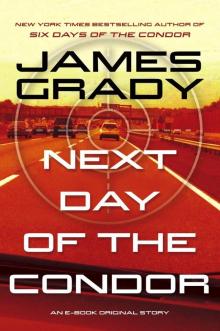 Next Day of the Condor
Next Day of the Condor